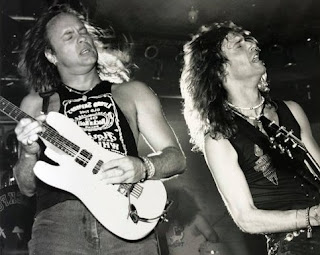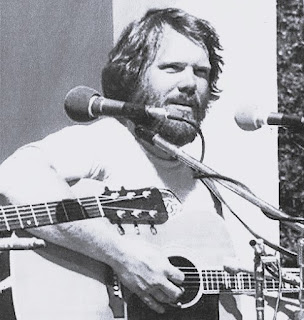
When I started my slimmed down versions of (too) massive tribute albums with the one on The Grateful Dead I talked a bit about my motivations to do so - mainly a weeding out the chaff and going for better listenability thing. But rarely are they needed, strictly speaking. In the case of The Metallica Blacklist, I would argue, something like my little compilation is definitely needed, for two reasons. One is the classic massive overload of material, in this case worsened by a lot of the music sounding quite samey and also being samey, because they are the same damn songs. Since there were no equal terms on who was covering what, and the album that is being paid tribute to only has twelve songs there is a massive overlap in songs, since many artists when for the big, most recognizable songs. But all that would have still been a minor inconvenience if not for the absolutely insane way the compilers of the box set decided to present things. They kept the running order of the original album, which might have seemed like a good idea until a couple of minutes in, when you realize after the first song that there is another five consecutive stabs at "Enter Sandman" coming your way before you hear something else. There are seven consecutive versions of "The Unforgiven" and a mind-blowing twelve versions of "Nothing Else Matters" - an etire album's worth! - all programmed to run one after another. Nothing else matters, indeed. Or, you know, maybe it does.
So my version does take the original concept, without the insane amount of same songs and repetition. So you'll have one representation each of all songs of Metallica's 'black album' in the original running order, plus a bunch of the best variants as bonus tracks. Pretty straightforward, and as with all my comps, programmed to be able to fit to burn on a disc should one so desire. Let's be real: No one needs covers of the Black Album songs for four hours, and certainly not in the way the original box set was programmed. My criteria for choosing were obviously personal preference, but also the originality of the cover version and the variety of style, if proposed. A lot of the covers were essentially well-meaning karaoke, so I refrained from putting those on there, if possible. If you want something that sounds like the original, just listen to the original, which is still a great album by the way, sell out whiner crowd be damned.

There were two competing takes on "Enter Sandman", both of which I liked a lot, but the version of Alessia Cara & The Warning beat out the one by Rina Sawayama by a slim marging, maybe because I like the "who-o-o-o-o" after "off to never never land", thus pushing Rina's impressive industrial rock reading to bonus track status.
Jason Isbell's take on "Sad But True" goes for deranged hillbilly rockabilly (hillrockabilly?), which then, incidentally, sounds really close to what those Finnish pranksters Steve'n'Seagulls were up to with the same song.
Biffy Clyro start slowly and relatively sweetly, but boy, when the heavy guitars kick in, they really kick in. Much heavier than I thought these guys would be. They continue this little interplay, which gives "Holier Than Thou" its appealing dynamics.
Again, quite a lot of choice for "The Unforgiven", but I went with Ha*Ash's beautiful version, including a surprise appearance of one chorus in Spanish.
I wasn't particularly in love with any version of "Wherever I May Roam", with most of them feeling like o.k. karaoke, and had J Balvin's take, doing a smooth Latin rap (I'm told it's calles trap these days?!?) over the riff of the song, with James Hetfield's vocals coming in at the end, in the line-up. But if we're fair, that one's more of a remix than a reinterpretation, so I pushed it into bonus track status at the last secons, replacing it with Jon Pardi's stadium country rock verion with its crazed fiddles.
French house producer's SebastiAn's contribution was an off mash up with a transition that really didn't work, but none of the other covers of "Don't Tread On Me" worked for me, so I kept this, a short 80s electronic funk with Hetfield's original vocals. It's pretty fun, and much better without the akward transition into an orchestral "Nothing Else Matters".
Nigerian artist Tomi Owo's take on "Through The Never" probably takes first prize for 'biggest re-invention', turning Metallica's thrash number into R'n'b territory, and doing it exceptionally well. So well that I lopped off the frankly stupid heavy metal instrumentation they added to the last minute of the song.
The second biggest transformation probably belongs to My Morning Jacket who transform "Nothing Else Matters" into a mix between power pop and the Beach Boys, as improbable and hopefully appealing as that sounds. It did to me, beating out all the mellow or dramatic takes on the song, though Dave Gahan's stately take on the song as well as Phoebe Bridgers' delicate folk interpretation both show up as bonus tracks.
"Of Wolf And Man", one of the true deep cuts on this album, only has one representation on The Metallica Blacklist, thankfully Goodnight, Texas' spooky Americana take is a good one. Imelda May turns "The God That Failed" into a swampy, swaggering blues rock number, while Frenchwoman Izia turns "My Friend of Misery" into very nice mainstream rock. I originally had Kamasi Washnigton's almost seven minute jazz tour de force in this spot, but it slowed momentum down too much and thus got a trip to the bonus track bench.
And then we close out with the delicate acoustic fingerpicking of Rodrigo and Gabriela, the sole representative of "The Struggle Within", but again, thankfully a really nice one.
So, liner notes, huh, they sure make those write-ups end up a bit on the long side, right?! So time to let the music take over...here's almost 80 minutes of some very varied takes on some really good Metallica songs. Devil's horns up, amps all the way to eleven - let's rock!



%20-%20Copie%20-%20Copie.jpg)

















































